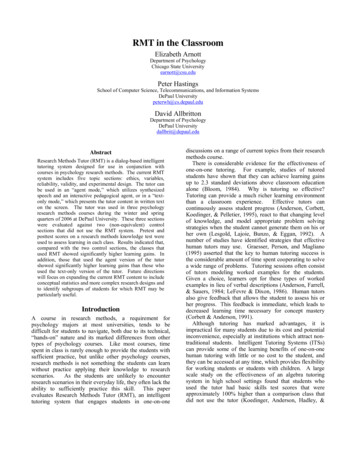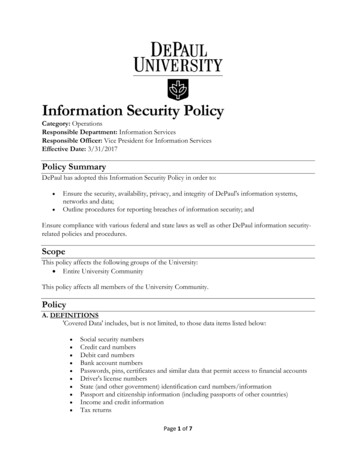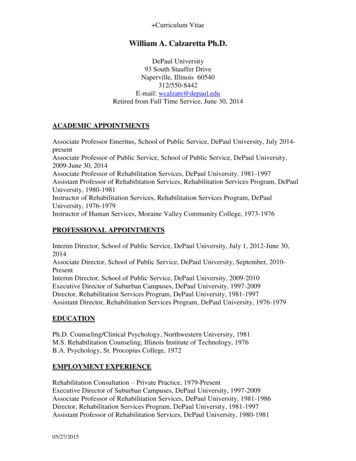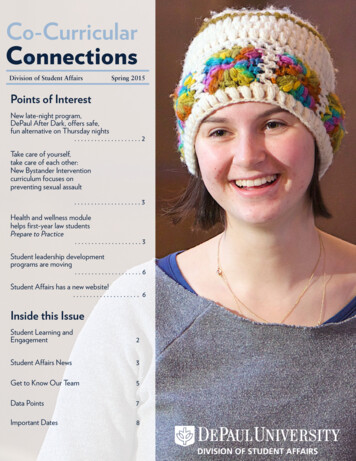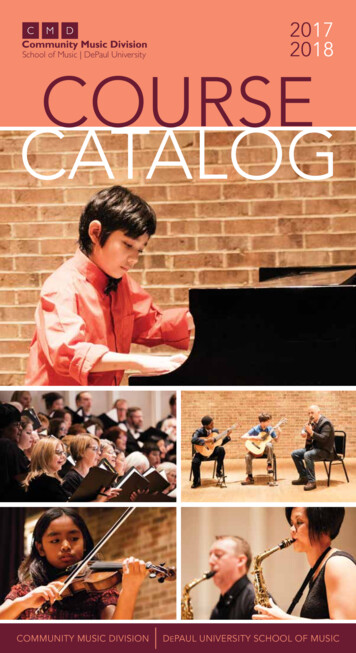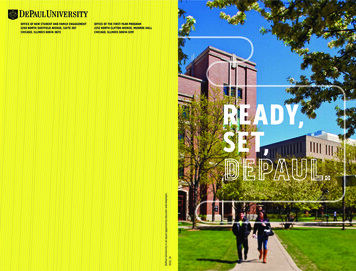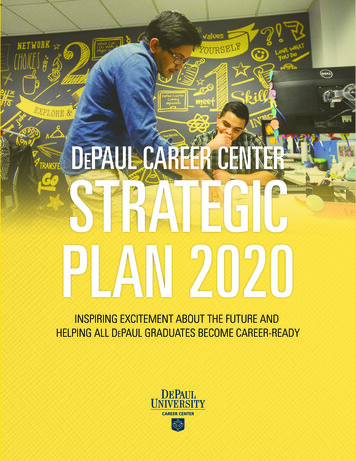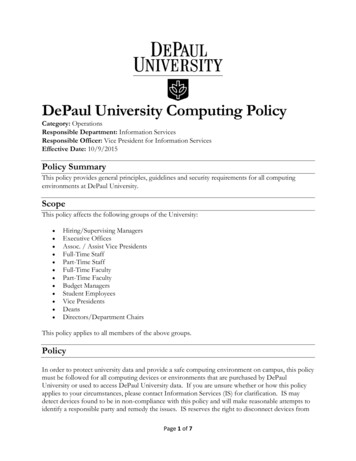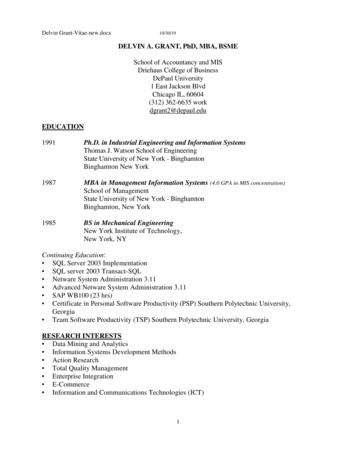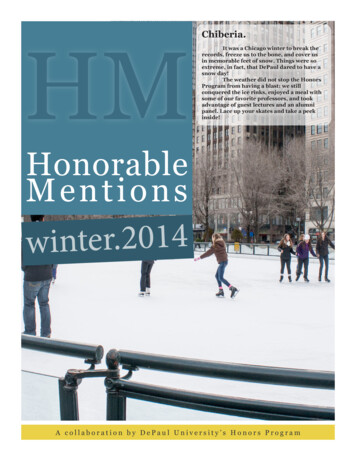
Transcription
HMChiberia.It was a Chicago winter to break therecords, freeze us to the bone, and cover usin memorable feet of snow. Things were soextreme, in fact, that DePaul dared to have asnow day!The weather did not stop the HonorsProgram from having a blast: we stillconquered the ice rinks, enjoyed a meal withsome of our favorite professors, and tookadvantage of guest lectures and an alumnipanel. Lace up your skates and take a peekinside!HonorableMentionswinter.2014A collaboration by DePaul University’s Honors Program
Table of ContentsCampus Resources. 3Honorable Announcements. 4Honors Events. 5Professor Allison McCracken Speaks At Honors Student Government Meeting (Taylor Gillen). 5Pictures from the Honors on Ice event and the Student Faculty Dinner. 6Social. 7Profile: Matthew Girson (Taylor Gillen). 8Honorably Involved. 9Lincoln Laureate Award (Caelin Niehoff). 9DePaul Documentary Project Internship (Summer Concepcion). 10It’s All About the Smiles (Emily Creek). 11A Glimpse Into our Futures? (Michelle Grochocinski). 13Darndest Things. 14Creative License (Alex Jewell). 22Thanks to everyone who contributed!Co-Editors: Alex Jewell and Emma PotterAdvisor: Jennifer Koscohsgnewsletter@gmail.comCover photo provided by Lukasz Budolak.
3Campus ResourcesVisit the Career CenterYou may think the Career Center is only a place to go to find an internship. Sure, they do that, butthey also offer so much more! The Career Center can help you decide on a major, a career choice, helpyou polish your résumé, conduct mock interviews to hone your skills, and much more. The Career Centeroffers workshops ranging from job search strategies to interviewing skills to graduate school informationsessions. To find out more about what the Career Center can do for you, visit their website: www.careercenter.depaul.edu. You can also visit one of their offices at these convenient campus locations: in theLoop, they are located in Suite 9500 of the DePaul Center (1 East Jackson); on the Lincoln Park campus,they are in Room 192 of the Schmitt Academic Center (SAC) at 2320 N. Kenmore.Have a Big Paper Due Soon? The Writing Center Can Help YouMake it the Best it Can Be!The Writing Center provides help free of charge to all members of the DePaul Universitycommunity—including students, faculty, and staff. The Writing Center tutors offer assistance indeveloping successful writing strategies, and their goal is to help visitors become more comfortable withwriting tasks and more aware of composing processes that will allow them to complete these tasks well.They work with writers on many kinds of projects from research papers and lab reports to Master’stheses and personal projects. They offer techniques to help writers focus and develop ideas, evaluate andsummarize sources, and edit and revise their drafts.Visit the Writing Center’s website to find out locations, hours, services, and much more!http://condor.depaul.edu/writing/Learning CommonsServices are in full swing inthe Learning Commons this winterquarter. Located in room 111 on thefirst floor of the John T. RichardsonLibrary, the Learning Commons isa modern, collaborative learningstudio, which provides a variety ofpeer tutoring services and careerconsulting.Schedule of services:Academic Success Center Tutoring College of Education:Monday, Wednesday, and Thursday1:30-5:30Tuesday 2:00 -7:003CDM Python Tutoring:Tuesday 3:00-4:00 and 6:00-7:00Wednesday 4:30-7:30Resume Drive Thru - Career Center:Wednesday 11:00-2:30 and 4:00-5:30Writing Center Outpost:Sunday 3:00-7:00Tuesday and Wednesday 3:00-5:00Study Jam – Office of MulticulturalStudent Success:Monday, Tuesday, Wednesday 5:007:00Science and Math Learning CenterChemistry: Wednesday 3:00-4:30;Thursday 4:30-6:30Math: Tuesday 3:00-6:00; Thursdayand Sunday 3:00-7:00Psychology (Stats): Tuesday andThursday 3:00-5:00
Honorable Announcements4Save the Date!The 2014 Honors Ball: A Fairy Tale Cotillion is just aroundthe corner. This year’s Ball will take place once again in beautifulCortelyou Commons; beginning at 7 p.m. on Saturday, April 26th.Join us in for a wonderful evening of delicious food, delectable snacks,entertaining music and dance, and an enchantingly good time! Therewill also be a costume contest this year, and the most handsome manand woman will each win a special prize. Watch your email for moredetails. We hope to see you there!Join the Honors Relay for Life Team!Relay for Life is the American Cancer Society’s biggest fundraiser.Funds go towards cancer research as well as cancer patient support. Itis an all-night, 12 hour event in which participants form teams to walkor relay around the track at all hours of the night. There will be food,games, music, and other entertainment to make it a fun and exciting event! This year’s theme is “camping,”so gather together your flashlights and sleeping bags to help fight back against cancer! The date is FridaySaturday, April 11-12, 6 p.m. to 6 a.m. at the Ray Meyer Fitness Center. To join the Honors team, or for anyquestions, contact hsgservicecommittee@gmail.com.4
Honors Events5Professor Allison McCracken Speaks At Honors Student GovernmentMeeting by Taylor GillenThe Honors Student Government officers occasionally inviteprofessors to speak at their biweekly meetings. These lectures providehonors students with a taste of various fields of study they may notbe acquainted with. Friday, January 24th’s meeting featured AllisonMcCracken, Associate Professor and Director of the American Studiesprogram.“I’ve always wanted to study mass media,” McCracken noted. “Howpeople decipher text and gain meaning from it is a major interest of mine.”McCracken studied as an undergrad on the East Coast. She later obtainedher PhD in American Studies at the University of Iowa. She taught at theUniversity of California--Berkeley for a year, but later decided to come toDePaul University.Professor McCracken discussed fandom at the meeting. In particular, she talked about theincreasingly prevalent role that fans have on the production of mass media. Not too long ago, writers,producers, and directors exercised immense creative freedom. In recent years, however, they havebecome more responsive to the requests of the public. This is new, and technology is largely responsiblefor the rapid dissemination of information that makes this possible.Professor McCracken cites Glee as an example of the expanding role of fans. “People createwebsites to discuss recent episodes and predict future events,” she claims. “They even write fan fiction,in which they re-create scenes or expand on relationships between two or more characters in the show.”The show’s crew can easily access this information by going online. In fact, when they introduced a gaycouple (Kurt and Blaine, or “Klaine” as many fans refer to them), Glee followers responded positively.They even influenced the creators to introduce another relationship, this time between two youngwomen.This example is one of many that Professor McCracken used. She also spoke with honorsstudents about the sociological side of pop culture, such as the fact that television continues to promotecertain cultural norms and devalue others. Her lecturegave honors students a delectable taste of what thefield of American Studies has to offer. In doing so, shealso promoted the mission of the Honors Program:to encourage students to explore new paths, to gainexpertise in a variety of areas, and have an unquenchablethirst for knowledge.Honors student Michelle Grochocinksi listens to Professor McCrackenmake a point.5
Honors Events6Highlights from the Honors On Ice event (above) and theStudent Faculty Dinner (below).Millennium Park was the setting for Honors on Ice on Friday, Feb 21st. Students braved the cold to test outtheir skills at Chicago’s premiere outdoor ice rink. The winter quarter Student Faculty dinner was at Duck Walkrestaurant on Wednesday, Feb 12th. Faculty and students enjoyed conversation and delicious Thai food.Photo credits: Lukasz Budolak and Alex Jewell6
Social7Facebook: The Social (Support) Network by Anna HansonFirst, we lost our grocery store. Then, we went on to lose the ole reliable UPASS system toVentra, rendering us with a whole host of new problems. If that weren’t enough, we lost all feelingin our extremities due to the frigid temperatures. With this series of unfortunate events, one canconclude that this Winter Quarter is out to get us. So, as college students in the technological age,we do what we do best: pour out our frustrations on Facebook. In light of the multiple dilemmasfacing students, however, there has been a shift in how we as students are utilizing the socialnetwork that devours the innocent, spare moments in our busy lives.We complain, oh yes, we complain. But now, we also support.It is as if there is so much to complain about that students are reverting to the ancient waysof behaving kindly on the Internet. The problems with Ventra have inspired many choice wordsthroughout the social media realm, but read the comments and you will see words of validation,advice, and, of course, a humorous meme or two to lighten the mood. Cursing Dominick’s forbetraying the hungry students of DePaul? Expect comments with suggestions such as usingPeapod, the popular online food delivery service. Post a picture of yourself in -15 degrees? Youcan bet the commentswill tell you to stay safeand bundle up, not tomention prayers for asnow day.This patternappears throughoutthe posts concerningthe Winter Quarterdifficulties plaguingstudents. Studentsalways use social mediato express frustrations, turning your average newsfeed into a treacherous graveyard of whinyposts. With this increase in positivity and supportive comments, Facebook may be the newest“social support destination”.So, the next time you need to vent, reach out to the newest support group for everydayconcerns. Everyone likes to be heard, and if the weather isn’t cooperating with your pleas forwarmth, join the online choir debuting on Facebook: the social support network.7
Profile: Matthew Girson8Don’t Be Mediocre! by Taylor Gillen“Students should study mediocrity so they do not embody it,” remarked Associate Professor MatthewGirson insightfully, an Honors professor here at DePaul whom I had the privilege of speaking with. Indeed, westudy history so we do not repeat it. We study law so that we do not wrong. As honors students, perhaps wewould benefit from studying mediocrity so that we may learn to break the walls of normality and definitivelycontribute something new.From childhood, Girson had a passion for art. He studied at the University of the Arts in Philadelphiaduring his undergraduate years, and moved on to the University of Illinois at Chicago for graduate school. Hetaught at the School of the Art Institute of Chicago for five years before coming to DePaul to teach in the Art,Media, and Design department.Professor Girson teaches a number of courses in this program, including painting and drawing studiosand seminars on contemporary art. One class he finds particularly interesting is a seminar on irony. Inaddition, his honors courses are HON 205 (the interdisciplinary art requirement) and HON 350 (the capstonerequirement). With regards to teaching the honors classes, Girson said, “I enjoy them because the studentsthat sincerely care about the classes are the most honest and dedicated students I have met at DePaul. Ialso find a great diversity of students here.” However, his favorite class is one he no longer teaches. Called“Rethinking Aesthetics: Mediocrity, Boredom,and Failure,” Girson stated that “I taught the classbecause no one else was qualified, and I stoppedbecause I was not good enough.”When asked about influences, Girson stated, “Iam influenced by poets as much as visual artists.Though I do not write poetry myself, it doesoccasionally leak into the titles of my work.” As forartists that influence his visual work, he cited Josephand Anni Albers. These two made a major impacton textiles and other mediums of two-dimensionaldesign in the twentieth century. As for poets, Girsonlisted Paul Celan and Wislawa Szymborska asinfluencers.Many LAS professors conduct substantial researchoutside of the classroom. For Girson, his studiopractice is his research. “I am always working onsomething. The perspective I bring as an artist isthe value that I bring to the university,” Girson stated. In addition to teaching and painting, he has also hadcuratorial experience in various Chicago museums. He has also had numerous solo and group exhibitions. Infact, he is currently working on several pieces that will be featured at the Chicago Cultural Center this summer.As I was leaving his office, Professor Girson bid me farewell by stating, “Have a nice day, and don’t bemediocre.” I believe DePaul’s student body and faculty alike strive to go above and beyond with their work.Though it may prove difficult, Matthew Girson tells us to not allow ourselves to fall into the cracks. Instead,we should continue to explore new paths and engage in meaningful discussions. If you are looking for afascinating class, I recommend one of Professor Girson’s.8
Honorably Involved9Lincoln Laureate Award by Caelin NiehoffThis past October, I was named as a 2013-2014 Lincoln Laureate Award recipient. The awardrecognizes one graduating senior from each of Illinois’ universities and colleges for their variousacademic, co-curricular, and community service involvements. Within a few weeks of receiving theaward from DePaul, the Lincoln Academy asked me to speak on behalf of all of the student laureatesat the capitol in Springfield.Looking back and reflecting on the awards ceremony, I think it’s easy to become fixated on itsformalities. I chose, however, to acknowledge the less evident privileges that the experience offered.When I spoke to the assembly, I spoke of the uncertainty that college seniors face—their futuressaturated with ambiguity. For as frightening as that uncertainty can be, it was reassuring to be in aroom full of high achieving young adults who were all in the same boat. Speaking with other studentlaureates helped me understand our shared aspirations as well as concerns.The weekend in the capitol was also humorous. This “road trip” with my parents was longoverdue. We managed to get lost, despite the city’s smaller size (at least in comparison to Chicago),and we circled the governor’s mansion several times before we figured out how to get to the housefrom the front gate.DePaul staff and faculty have supported my academic and co-curricular interests from dayone (award or no award), and I think that’s very telling of the university. I appreciate DePaul’scommitment to both service and civic involvement. Its employees have played a pivotal role in myeducation and self-development. I hope honors students will continue to speak publically abouttheir involvements in and outside the classroom, while remembering the importance of humanrelationships that exist within those systems.L to R: Lincoln Academy and DePaul TrusteesJohn Simon, William Bennett, Caelin, CynthiaSummers, Interim Vice President for StudentAffairs, Ernest Wish, DePaul Advisory Council.
Honorably Involved10DePaul Documentary Project Internship by Summer ConcepcionBeing in the presence of well-respected Chicagojournalist Carol Marin never ceases to amaze me. Interningfor her through the DePaul Documentary Project (DDP) is anaspiring journalist’s dream come true, to say the least. I’venever met anyone so fiercely passionate about holding ontojournalistic integrity to the point where it’s infectious, whereI feel inspired every day to keep pursuing journalism. Inshort: journalism is alive and well, and Carol is living proof ofthat.Carol is the political editor at NBC 5 Chicago,a political columnist at the Chicago Sun-Times, and acontributor to WTTW’s Chicago Tonight. Not only do Iwork closely with Carol, but I also work with producer DonMoseley (or rather, Carol’s “partner in crime”) on conductingresearch for NBC 5 News’ investigative unit stories andaccompanying them on assignments. I’ve also had theopportunity to attend press conferences and court hearingsfor the recent David Koschman case.The broadcast and investigative journalism worldwas unchartered territory for me prior to my interning atDDP in the fall. I’ve wanted to be a journalist since I was13 and have had a lot of experience on school newspaperpublications (including The DePaulia, where I currently serveas online editor) and experienced being an editorial intern and current freelance writer for the Chicago Reader. Two quarters later andthanks to DDP, I can now say that I have a better sense of what working for broadcast and investigative journalism entails.Broadcast journalism is a lot more fast-paced compared to print journalism. But whether you’re in print or broadcast,journalism is hard work ‒ a fact that Carol and Don remind me of each day at DDP. There have been times when journalism seems likeone of the most unglamorous professions out there. Tasks such as going to the Daley Center to pull up public documents almost everyweek during fall quarter were intimidating at first and not always easy. Spending countless hours compiling data from databases such asthe Illinois State Board of Elections is not always the most exciting task, either, since I’m not a math aficionado. Nonetheless, throughthese “unglamorous” experiences, I’ve realized how much I love journalism. The beauty of journalism is that it’s a constant learningexperience, and my experiences at DDP have allowed me to learn to stand my ground and face each obstacle head-on.There are two pieces of advice I’ve received through DDP that I take to heart:1. When I was telling Carol about my fear of not attaining a journalism career post-college, she told me, “Never let fearparalyze you.” This gives me more motivation to keep going. Despite the notion that the journalism job market is a difficult one tobreak into, Carol reminds me that nothing comes easy. Perseverance is key in pursuing passions in life.2. Don told me that the greatest advice he heard in college is to “be resourceful” and adds that it’s also important to “be bold.”Acting like you’re confident in what you’re doing allows others to not walk all over you. Being resourceful means not giving up whenthings don’t go your way and realizing that problem solving involves creativity.As I write this, my weeks left at DDP are dwindling. I’m sad thinking about how the internship will end soon, but I have moreconfidence in taking the next steps. The hands-on journalism experience I received by interning at DDP has taught me a lot more thanany of my journalism classes could. I have had the privilege of learning the ins and outs of the news industry from two of the mostrespected figures in the field. If journalism does eventually work out as a career for me, I can honestly say that I will always attribute mysuccess to the time I spent under Carol and Don’s guidance at DDP.Through my time at DDP, I am also inspired to someday be a journalist who pays it forward by mentoring young aspiringjournalists. Although Carol and Don are two of the busiest people, they are two of the most generous people I’ve ever met and I’mforever grateful that they treat their interns as their teammates. There hasn’t been a moment when I’ve felt underappreciated, and Ibet that every DDP intern feels the same way.Thank you DDP for reminding me that the spirit of journalism is far from fading away anytime soon.10
Honorably Involved11It’s All About the Smiles by Emily CreekWhen I decided to write an article about the 2013 Global Water Brigade, I planned to writean article about what happens, how to get involved, and how to do your part here. But cominghome from Honduras, for the second time in two years, this article changed its own course. This isnot a “what is a brigade” guide, rather this is the story of smiles.I have been to Honduras twice since starting here at DePaul. In 2012, I went on my firstWater Brigade trip as a volunteer, and this past December I was the co-leader of the 2013 group.I had a bit of doubt in my soul that this brigade might not be as perfect as the first, where I metsome of my closest friends and began to understand what path my life was taking. But of course,things have a way of working out, and this brigade was incredibly different.This past December, I co-led a group of 18 DePaul students. We stayed at Hotel ClubMorzan in San Lorenzo, a town in the south of Honduras. Our task was to break ground on awater system in the nearby small community of El Ojochal. We realized we had our work cut outfor us as we began to work on the thick clay and huge boulders, with temperatures in the 90’s.At the end of the first day, our trench diggers were left with low spirits and a lack of motivation.It was time to mix up the game plan!My co-leader and I talked to the head of the staff about working closer with the communitymembers, who were both far more skilled than we were and who we really wanted to get to know.So the next day, we were paired up with workers from the community. The workers were men,typically young fathers and some teenage boys. They spoke zero English and most of us spoke verylittle Spanish. Enter smile number one.With nothing but a shovel (or pick axe) and our smiles, we got to work. With our smiles, weknew when to do our part and when they were doing theirs. We answered the questions we couldand smiled and shook our heads when we couldn’t. They laughed at our replies, or when we madefools out of ourselves and suddenly it was time to go. At the of the second day, we looked back tosee over twice the amount accomplished as the first day, and new friends waving us goodbye.The third day of work was pipe-laying day. On this day, our staff decided we should workhand in hand with the kids from the community. We each got paired up and sent off to work. Thekids were mostly boys, though some girls came as well. They were ages 6-10 and worked harderand faster than us college kids. Now, it is a bit easier to speak Spanish to children, as they laughand don’t judge your grammar. Still, for many on our team, the task of communication proveddifficult and daunting. Enter smile number two. Even if we didn’t understand the question, thekids’ smiles let us know if they wanted to try on our gloves or sunglasses, if they would like someGatorade, or if it was time to move on.A smile seems simple enough. But when there is a lack of language, the smile becomes thelanguage. It helps you decode all sorts of things and communicate. My favorite smiles are the out-11
Honorably Involved12loud smiles, those smiles that turn into gut-hurting laughter. There were all sorts of smiles in ElOjochal. The hardest were the smiles that came with the waves goodbye, the smiles with the weteyes. Happy because we came and became their friends, sad because we were going.Yes, the DePaul Water Brigade went to install a water system and thus, change the livesof El Ojochal, and that we did. But El Ojochal changed us as well. The most miraculous part ofthe brigade was the community. It was the smiles. It was the openness. We DePaulians learnedhow to soak up the company of those around us, how to appreciate the simple things, and how tosmile more freely. El Ojochal was thankful, very true. But, most of all, just like us, the people of ElOjochal wanted to make friends. And with the power of 22 (or so) muscles, futures changed.When people ask why I spend time in Honduras working in heat and dirt, I know that theanswer is for the children because they smile, and I never want them to stop.To find out how to experience smiles for yourself, contact: depaulgwb@globalbrigades.org.12Photo credit: Emily Creek
Alumni Panel13A Glimpse Into our Futures? by Michelle GrochocinskiIt sometimes feels like DePaul is beating socially responsible leadership theory over our heads.Yet at the Honors Alumni Networking event put on by the Honors Student Government, we metDePaul alumni who became just that—socially responsible leaders. And it was inspirational.Of the four graduates, three held careers in social work and employment allocation services:working to establish concrete jobs and homes for others. The fourth graduate trained as an engineer,spending his workday developing sustainable energy practices for a large corporation. They all foundtheir way to meaningful careers—but the path there, they emphasized, was twisting and unclear. Infact, each changed majors at least once. The alumni stressed searching for the occupation that fits youand your values. Moreover, only one worked directly in the field correlated to her major- providingreassurance that you are not stuck within the constraints of your degree. According to her, a largepercentage of current employees are not in the field of their major. They advised that students shouldfocus on career networking and skill development as well as picking a major that interests you.Last quarter, the first of my second year at DePaul, I learned that I could graduate fourquarters early. This induced rapid-fire scheduling of advising appointments, workshop attendance,and networking. Having taken advantage of most of DePaul’s career resources at this point, I wishthe value of career planning and development had been stressed to me from the start. Learningthat employers expect you to have 2-3 internships upon graduation as a Junior is less than ideal.Students should reach out and begin their career, not just their education, at DePaul. We need to takeadvantage of our resources before these days turn into memories. We are Generation Y, and when itcomes to choosing a career, we need all the help we can get!Honors Program alumni panel, L toR: Betsy Hushek (CMN ’10), Marketing andCommunication Officer, The Chicago Councilon Global Affairs; Garrett Napier (LAS’12), Housing Advocate, Ezra Multi-ServiceCenter; Amy DeLorenzo (LAS ’09), ProgramCoordinator at Chicago Cares; David Poli(CSH ’09), Energy Manager, AT&T.
14Darndest ThingsWhile we don’t advise listening to other peoples’ private conversations, sometimes you can’t help butoverhear the very strange things they say around campus.This is a thesis. I’ll getover my tears.I love the Loop campus.It’s just like the realworld.I’m glad I made herday because I ate mychapstick.““There’s caffeine in RedBull?Too much of anything isa bad thing. Except formoney. And ice cream.I’m not scared to dance.“Have you ever hit theSpanish button at Jewel?14I don’t ever plan on fullymaturing.Being stupid is fun.Chipotle is the food of thegods.Why be mean in life?Grad school is not abouthow smart you. It’s abouthow hard you work.I’d rather be a nerd thannot be one.iPhones are all like, “Me,me, me!” Where’s the,“Us”?Only celebrities listen toeverything I say.My kids will not knowhow old I am.I feel proud to be aterrible consumer.Wearing my luckyunderwear did not help.You sound like an idiotwhen you say, “based offof!” It’s based “ON,” not,“OFF OF”! Look it up!““Do you juggle, though?
Creative LicenseThe Art of Man, on Super Bowl SundayI hear the dryer anxiously tumble through my intimates;Trying to go undetected, I know,Because I offered.In the curves of ruffled sheetsLies silhouetted lonely crescents,Like a clear sky on a quiet nightWhen all your laundry is done;Moonlit, half-empty;Short lived.I hear the termites go to workOn your morning wood,A gift from your last beloved;She feared fulfillment,Loved to throw paper footballs,And danced in the end zone.We clasped fingers at the waistTo keep honest hips,In case of marriage;If the heart ever slipped;I do, I can’t,I'm the whisper in a cockpit.with Alex Jewell1515
“Peace is worth more than all worldlyposessions.”St. Vincent DePaul
A collaboration by DePaul University's Honors Program Chiberia. It was a Chicago winter to break the records, freeze us to the bone, and cover us in memorable feet of snow. Things were so extreme, in fact, that DePaul dared to have a snow day! The weather did not stop the Honors Program from having a blast: we still

